REPRINTED FROM JULY 2019
Sam Nader’s Century:
‘Mr. Oneonta’ Turns 100
Remember Mayor Who Brought Yankees Here

Editor’s Note: In remembrance of “Mr. Oneonta,” who passed away yesterday, here is “Sam Nader’s Century,” a profile of the beloved former mayor and baseball entrepreneur that appeared on his 100th birthday in July 2019.
By JIM KEVLIN • Special to www.AllOTSEGO.com
ONEONTA – Sam Nader’s life is one great story after another.
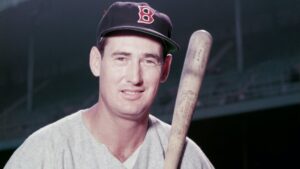
Here’s a favorite one, about playing golf at the Oneonta Country Club with Hall of Famers Bobby Doerr and the legendary Ted Williams, and the club champion at the time.
Sam played one of the best 18 holes of his life.
“Bobby had a 76 – 3 under par,” Nader, who will turn 100 on July 8, recalled the other day. “I was 4 over par. We took them for 10 bucks.”
Ted Williams was so incensed, he broke five clubs – a golf club set – over his knee. (The Red Sox legend was working for Shakespeare, the quality golf-club maker, so he made good.)
With a laugh, Sam continued: Every time he would see Bobby Doerr and a Hall of Fame event in Cooperstown, the former Oneonta mayor and owner of the Oneonta Yankees would say, “Let’s go up to see Ted and see if he remembers.”

Sitting in the livingroom at 95 River St., the ranch house where he’s lived for many, many decades and where he and wife Alice raised their three children – SUNY Farmingdale president and former mayor John, and daughters Suzanne Longo of Pennsylvania and Alice O’Connor of Georgia – he spun off yarn after yarn.
- Of his boyhood in the immigrant-filled “Lower Deck” – Lebanese like his family, Italians, Poles, Russians. “They were all my pals.”
- Of learning life’s lessons early at St. Mary’s, going off to World War II, joining Bendix (now Amphenol), where he spent his career, rising to director of purchasing.
- Of marriage: in be-pillared Colliscroft, to Alice House, daughter of a prominent physician and descendant of Eliakim Ford, the first president of the Village of Oneonta, and key player in bringing the railroad here. The union breached the social divide between River Street and Walnut Street.
- Of politics: Spurned by the dominant Republicans after three terms as alderman, he formed the Good Government Party and, then endorsed by the Democrats, won the mayoralty. He would open the modern Oneonta Municipal Airport – now the Sam Nader Municipal Airport, 30 years of daily passenger service to LaGuardia followed – launch Urban Renewal, and learn which levers to push to bring federal aid here.
- Of baseball, bringing the Yankees franchise to Oneonta’s Damaschke Field (1969-93). Many of the great team’s greats, from Mickey Mantle to George Steinbrenner, got to know the City of the Hills – and Sam, them – over the years.
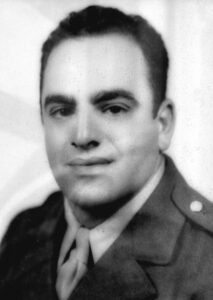
Albert “Sam” Nader was born on July 8, 1919, to Elias and Rose Nader, recent immigrants from Lebanon, who brought the baby home to 90 West Broadway in the Sixth Ward’s polyglot neighborhood.
Their apartment house, six apartments per floor, was popularly called “The Beehive.” By the time Sam reached high school, however, the parents had put aside enough to by their own home at 107 River St.
Growing up in the Depression, “we didn’t know we were poor” – everyone was in the same boat. But he remembers his dad, who worked for the D&H, coming home with a railroad tie under each arm, to be chopped up for firewood. That, and coal picked up along the tracks, kept the growing Nader family – two sons and four daughters – warm.
“I was very fortunate,” he said the other day. “I had the best heritage anyone could have.” His parents, “they couldn’t read or write in any language. They worked, literally, like slaves. They insisted the kids get an education.”
They, with the help of older brother Nate, also taught him right from wrong.
When young Sam, instructed by an errant cousin on shoplifting – pick up two jackknives, then just pay for one, he remembered – Nate found out.
When he got home, dad Elias had the boy kneel on a rail tie in front of a hot stove, reciting the Lord’s Prayer in Lebanese and English. When he flagged, his father smacked him with a razor strop.
The discipline stuck. “I never stole anything again,” the near-centenarian recalled.
A high-school freshman, Sam told his Latin teacher, Mrs. Stewart, he couldn’t stay after school to sharpen his language skills – he had to chop wood at home.
Brother Nate, then a senior, and who did most of the wood chopping at home, found that out, too.
Yes, Sam did spend THAT evening chopping that railroad tie, while Nate sat by in an easy chair. The next day, Mrs. Stewart lectured the class on “prevarication.”
“I never forgot that,” said Sam. “She became the best teacher I ever had. I took four years of Latin. I passed every Regents because of her.”
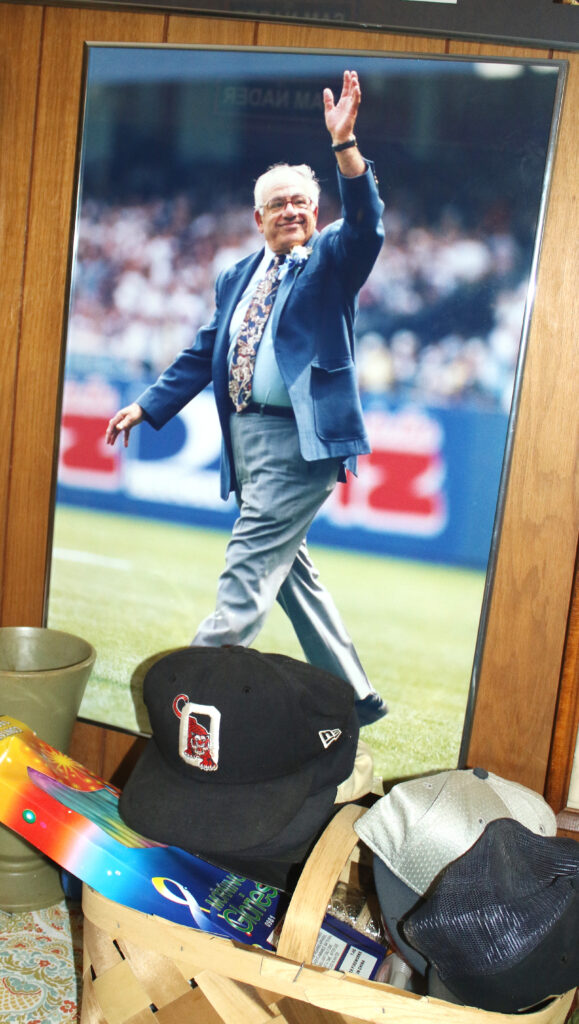
He grew up in downtown Oneonta’s heyday, and remembers Main Street’s packed sidewalks on Thursdays, pay day for the D&H’s workers. Saturday night was lively, too.
Saturdays his dad would give him 15 cents to take in the cowboy serials at The Palace movie house, where Community Bank is now – a dime for the movie, a nickel for a bag of candy kisses, that would last him all week.
He wistfully recalls Jack’s Restaurant, the Wagon Wheel, the nearby pool hall, The Klipnockie, The Royal, Henderson and Harris men’s stores, the jewelers, the department stores – “Oneonta was the shopping center for the whole area,” he said.
Asked about World War II – he was 21 when Pearl Harbor was bombed – he paused, in thought. A machine gunner with the 28th Infantry Division, he fought in the Battle of the Bulge. “I remember how cold it was,” he said. Another pause. “Bad memories,” he said.
Back stateside awaiting discharge, he volunteered to write sports for the newspaper at Camp Swift Baron in Texas.
“Who’d you ever work for?” the editor asked.
“Gene Ward,” the soldier replied, a reference to a famed New York Daily news columnist. That was partly true: “I caddied for him at the country club.”
Hired, Sam wrote sports in Texas and then at Fort Lewis, Washington, before heading back to Oneonta. As for Gene Ward, “I brought him here, back home, for one of my sports banquets,” he said.
At that point, Sam had two years of college – one at Hartwick, the second at Bates College in Maine – but returned to Bendix (Scintilla), where he had been working when the war broke out, and recalls the ensuing 43 years there fondly.
A rarity these days, Bendix had a heart, he remembers. His brother, Nate, was a supervisor of inspections. “He insisted, if you work for the company, you’ve got to give them 50 minutes” (out of 60 per hour), the younger brother remembers.
A young management trainee, Don Jones, just out of Cornell, was impressed. Years later, Nate came down with diabetes, had to take time off weekly for dialysis. His future had to be decided by the Bendix board, then in South Bend, Ind.
By then, Don Jones had risen to that corporate board and when Nate’s case came before it, declared, “As long as Nate Nader is alive, he will be on the Bendix payroll.”
Sam’s other Bendix memory – “I remember it vividly” – was flying to New Haven on a corporate airplane. Returning, a snowstorm had closed Oneonta’s airport. And Sidney’s.
“Gene, you got me up here,” he told the pilot. “It’s up to you to get me down … Finally, we crashed into a cornfield outside Cortland.”
Back home, he’d paid his dues on Common Council, and wanted to run for the top job in 1960, “but the GOP didn’t want me,” he said. “They said they couldn’t get me over the railroad tracks.”
“I had good friends, all over,” he remembered. About 1,000 people in Oneonta worked for Bendix, and the company’s data-processing office gave Sam a list of the names. “That didn’t hurt,” he said.
Election Day, Sam drove around the Sixth Ward, flashing “V” for victory. “Russians, Poles, Italians, they all rallied around me,” he remembered. “I carried this ward” – the Sixth – “by a large, large margin.”
He beat the Republican nominee, attorney John Dunn, by 17 votes, then handily defeated a former mayor, Roger Hughes, who challenged him in 1964 on the belief that candidates should not run unopposed.
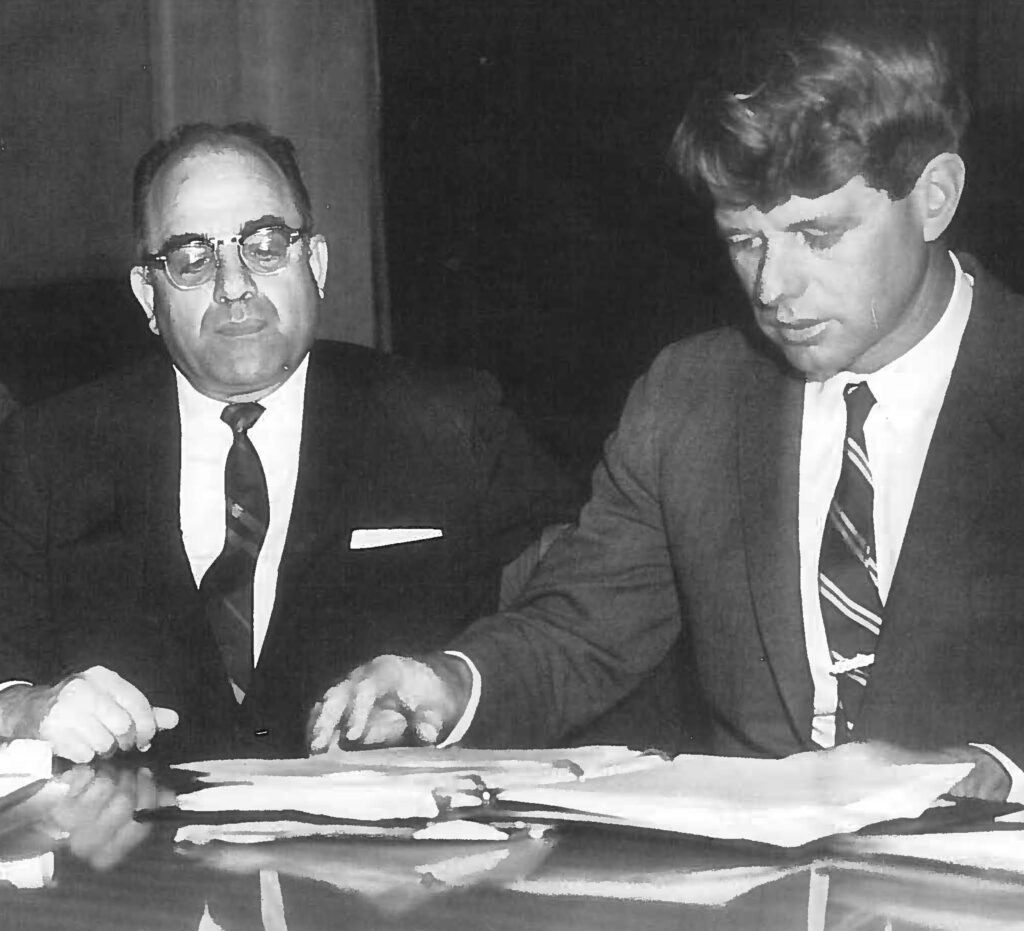
As Democratic mayor in a traditionally Republican city, Sam drew national attention, meeting his all-time favorite politician, Bobby Kennedy – “a real man” – three times. “He had honesty and realism,” explained Nader. “He was very concerned about people.”
Running for U.S. Senate from New York in 1964, a dinner was hosted locally at the Armory.
“Why isn’t your mother on the podium?” Ethel Kennedy asked Sam. She pointed out that John Burns of Binghamton, then Democratic state chairman, had his mother next to him.
“Nobody invited her,” Sam replied.
“Well, I’m inviting her,” said Ethel. For his mom Rose, it was the thrill of a lifetime, the son remembers.
And then there were the famous ballplayers, including Joe DiMaggio.
“Would you like coffee?” Alice Nader asked the famous Yankee when he stopped by 95 River.
“Do you have Sanka?” he replied.
“Sure,” said Sam, and he hustled son John off to the corner store to get a jar.
He and DiMaggio stopped by to see Al Farone, the lawyer and Sixth Ward VIP, who took Sam aside: “Do you think Joe would go to my house and see my sister? She’s devoted to him.”
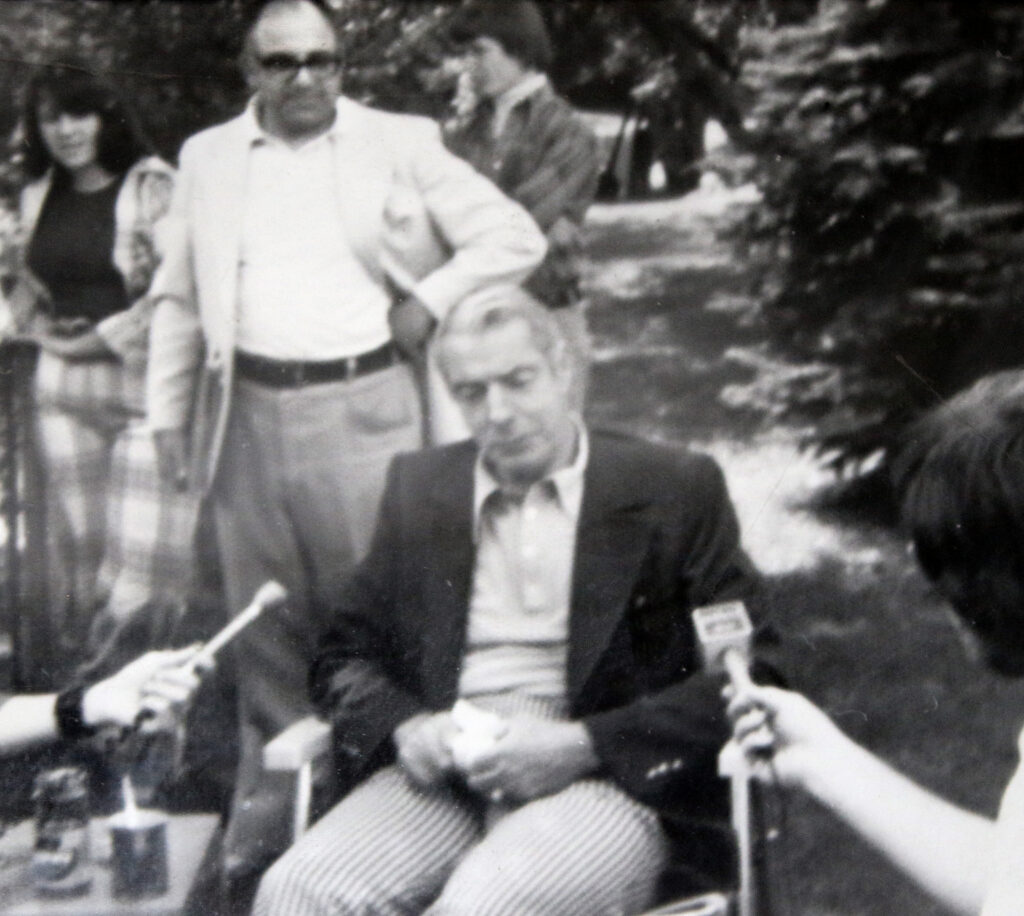
Sam took the Yankee to the Farones’ back door. Ida answered and was thrilled, “she hugged him and all.” Later though, “she gave me heck for not bringing him to the front door,” Sam recalled.
Through his years operating the Oneonta Yankees, Nader got to know many New York Yankees well – Whitey Ford, Yogi, Reggie. About the controversial owner George Steinbrenner, he’s emphatic: Steinbrenner should be in the Hall of Fame. “In my book, he’s a fine man,” he said.
When Don Mattingly Day was held at Yankee Stadium, Steinbrenner invited VIPs onto the field, and Sam was second. A poster-size photo of him waving to the cheering crowd has a place of honor in Nader’s basement, which is decorated with photos of his political and baseball successes.
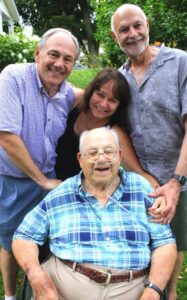
So now, on to 100, and a summing up.
Sam’s wife, Alice, was killed in a car crash 29 years ago while the couple was driving to Florida, and she immediately comes to mind.
“My wife has to get the credit for raising the kids – I was too busy working, politicking, with baseball,” he said, “and one of the things I’m proudest about is my children’s success.”
“They’ve been very good to me,” he added.
Advice?
“Make sure you have good parents. Don’t be afraid of hard work. And” – as baseball allowed him to be – “be around young people.”
“I’m proud to have so many good friends in such a great city,” he said. “The Lord’s been very good to me.”

